Griffin and Stan have never experienced learned helplessness. Stan was brought along slowly after he entered his former owners' lives as a 4 year old. I was the one who rode him the most; we figured the world out together. It was easy and full of options to make mistakes and learn from them. Additionally, Griffin has most certainly never experienced learned helplessness. He had a rough start after weaning, but was within care of those who knew how to properly care for him in a short couple of months. He entered my life in January 2012 as a long-yearling. From there he and I learned the ins and outs of groundwork and finding a common ground for communication based on body language and, later, vocal cues. He had, and continues to have, every opportunity to make mistakes, learn from them, and move forward.
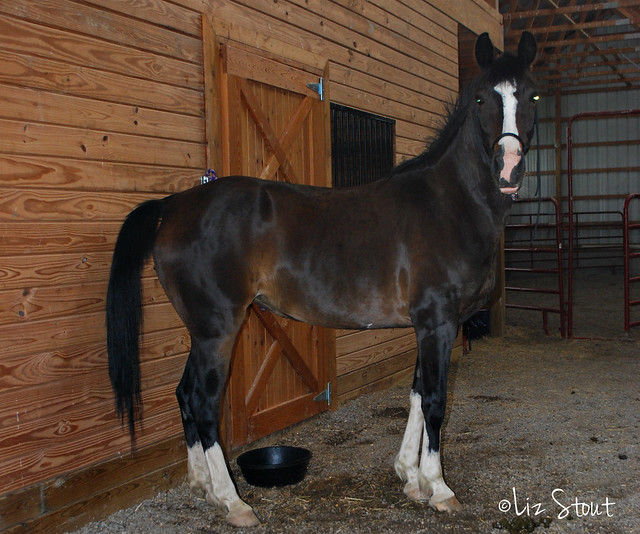 |
| I always forget she used to have this horrible habit of spinning and screaming when tied until I look back and find this photo. |
Q though? Q has absolutely experienced learned helplessness. The cowboy who "trained" her was the kind that pushed a horse to exhaustion. Pushed them to a point where they gave up. As an Arabian x Morgan, Q had more "fight" to her than the usual quarter horses he was accustomed to, so I anticipate he really ramped up his typical round penning, flag waving, and exhaustive tying techniques (head tied so she couldn't move about and a hind leg trussed up so she had to stand for long periods on three legs). He forced her to comply with his wishes and, largely, she did.
He told me during our clinic that she would be really good. She was. She didn't put a single hoof out of line. When it came time to do some backing exercises, he told me she'd be one of the best there. She was. He told me she didn't come to him that way. He told me she hated backing up and used to fight him over it. You'd have never guessed. She lowered her head and backed up as fast as a reining horse in competition. And when we enjoyed trail time the next day? She didn't spook a single time. She did everything asked of her on cue. She was a dream!
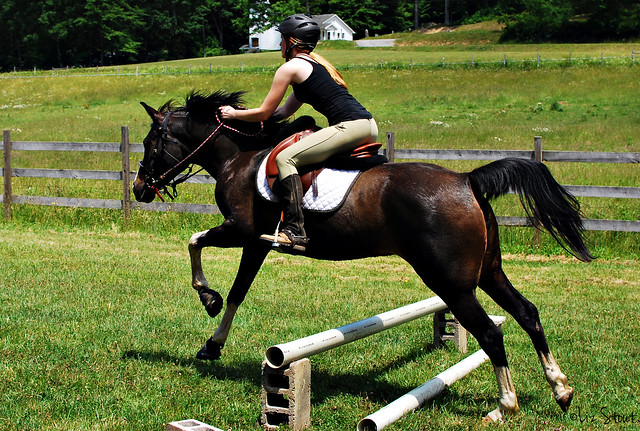 |
| Totally chill and completely relaxed with the task of "learning to jump" a week or two after coming home with me. |
The only thing that cowboy did right by her was not stalling her (or any of his horses). She at least had some time to interact with others in a healthy way, which I imagine saved her from the worst of things. However, what this turnout situation did do for her was ingrain herd boundness - and for some very justified reasons! Overall, it wasn't a great situation.
In hindsight, she was rather listless about the world during that clinic. In hindsight, she was, as mugs put it in her post, shut down. She had learned helplessness. It wasn't until I brought her home, into a situation where she had choices and could make mistakes without a huge drag-out, beat-down fight that she slowly "woke up" out of it.
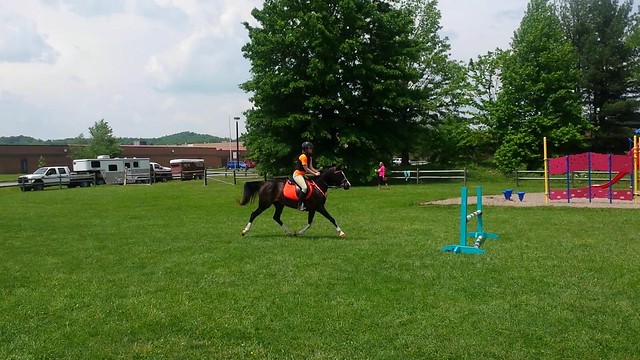 |
| Ugh, I remember having THE WORST TIME with her leading up to this day. On this day, she was AMAZING. |
It totally makes sense now why I struggled for so very long to get a good "feel" for her temperament and personality. She had shut herself off to people. It also explains why I began to struggle with her when I did. I complained that she hadn't "been this way" when I brought her home. And she wasn't. She was waking up out of the dark place she had been. But I didn't know that then. All I knew was that I was increasingly encountering a completely different horse than I'd had and it confused me to no end.
Unfortunately for us both, I didn't know about learned helplessness at the time nor did I have the tools in my toolkit at that point to help her through that transition period in a graceful, kind way. We fought a lot. Especially after I ruled out medical reasons for her behavior time and time again. I'm not proud of how I handled things, but I am grateful that I continued to explore many options for working through our issues instead of becoming stagnated in a bad place.
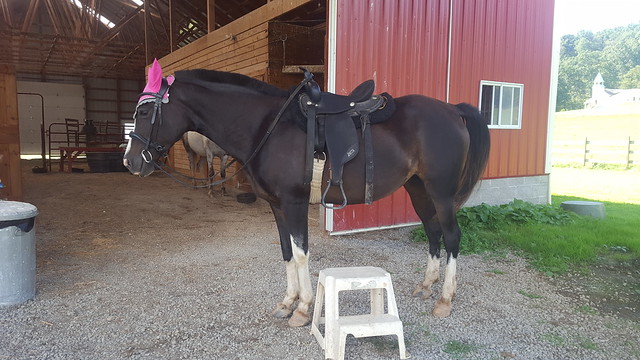 |
| Slowing down and starting again. The western saddle gave me the security I needed in those beginning days. |
When Q sustained her suspensory injury in late-August 2016, all work halted for nearly a year. We were forced to slow the fuck down, and it was the best thing that ever happened to our relationship. Bringing her back slowly following that injury has allowed us both to meet in the middle and come to a better understanding. Slowing down helped me to better understand the horse she was, for better or worse, and find a common understanding within that knowledge. It allowed her to realize that the monkey on her back could really be trusted and allowed her to build confidence.
Slowing down and starting again helped me to finally learn what kind of temperament and personality Q had. She's a sensitive, smart, quick-thinking horse. She is often suspicious of the world around her and has a hard time focusing on work until she feels secure and safe, some of which is absolutely due to humans but not all of it. She reacts quickly and instinctually when she is afraid. When she wants to get out of work she won't rear or buck (she has never executed either of these behaviors in my 6½ years of owning her), but she will initiate her horizontal teleport maneuver to express her opinion. Additionally, she loves her herd mates very much.
Understanding all of this has helped me build trust with her that I didn't have before. Now we don't fight, we banter. And 95% of the time it's absolutely comical. On the ground, when she's a shit, she knows it and she knows I know it. So when I shout at her and wave a finger or knock her on her shoulder and tell her to cut it out, she doesn't freak out and take offense. She stands there, as only a mare can, and grumps at me with her body language. And I laugh. Under saddle, I'm more forgiving of her "spooking" and use that behavior to recognize when she's struggling with an exercise. I can then break the exercise down more for her to digest or, if I know damn well it's something she knows damn well, I can continue to push her forward and ask again.
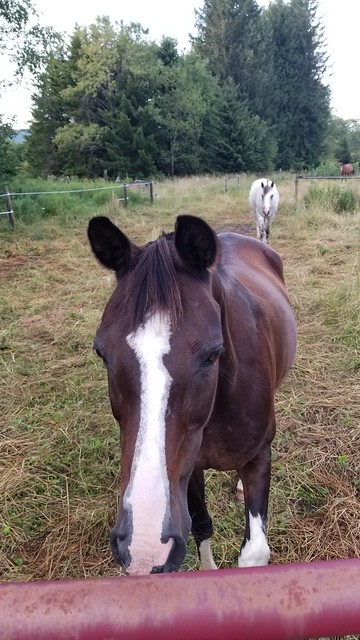 |
| Beating Grif and Stan to the gate to greet me. And this was after a gnarly 30-mile ride the day before! |
Her herd boundness is a tougher nut to crack, especially under saddle, but I'm seeing some progress. The more I work with her and provide positive experiences and fair leadership, the more interested she is in the work. Toward the end of her time in Canaan this summer, she was often the first horse to approach and greet me - even before Griffin who has made it his trademark to be the first to say "hi". It's a small step, but for her it's a big one. Working her in areas adjacent to the herd at home is still a feat, but maybe it won't be forever.
Beyond the increased quiet moments of understanding we have though, the biggest evidence of the increased trust we've built in one another shows up in those times when her instincts override her mind/body and she reacts with a startle/spook. Now, instead of running from the perceived danger and ditching me to do so, she does so in a way that is infinitely easier to ride - she essentially picks me up and takes me with her. Instead of reacting in a, "YIKES! Fuck this and you, I'm gone!" she reacts in more of a, "NOPE! Let's get out of here! Come ON!"
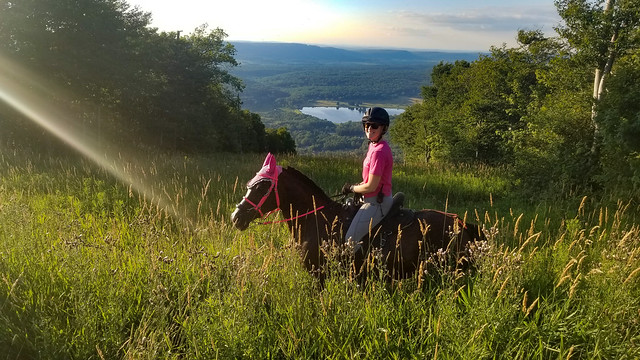 |
| Another of many rides Q led this past summer. And one of my favorite photos of the place I get to call home. |
Q has been the biggest struggle for me these past few years. Even though we have made so much progress this summer, there was something niggling the back of my mind asking questions and wondering why the train went off the tracks to begin with. The realization that she experienced learned helplessness feels like the final puzzle piece to understanding her; everything fits so neatly into place in my mind now.
I hate that Q had to be pushed to a point of learned helplessness before she entered my life. I am sad that I didn't handle things better with her as she "woke up" from it. But I am so very grateful that I now understand more and that we have had success moving past it. While I have every intention of bringing all of my future horses along in the way I did with Griffin, being aware of learned helplessness will help me in my journey with horses into the future whether the horses are mine or not.
: : : : :
I'm curious - have any of you had experiences with learned helplessness in your horses or horses you've worked closely with?

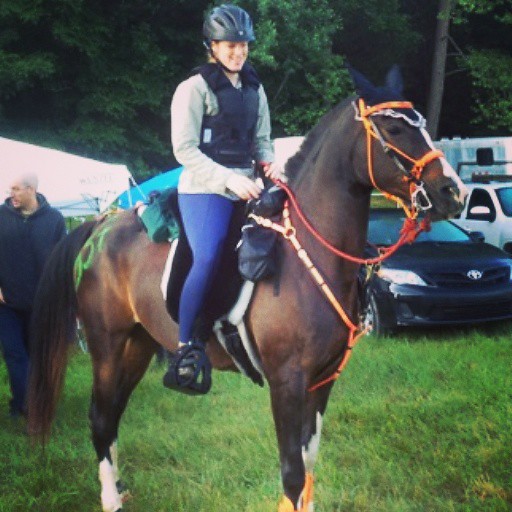
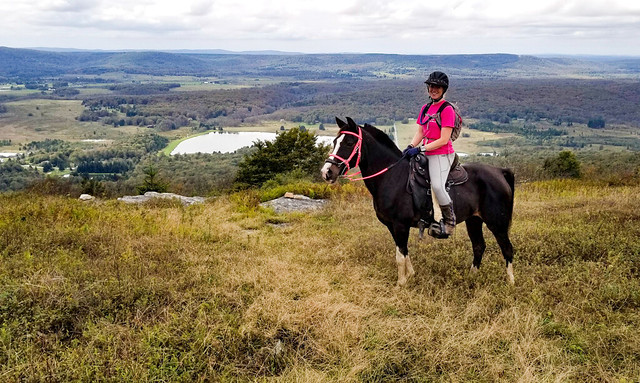
What a fascinating post. I think I could write a very similar post. Now that I've been really focussing on ground work I can see that Carmen's first response is to run away, then to shut down and then to seek an answer. Like Q she has a lot of fight in her and it just doesn't work. What opened my eyes was seeing that she needed to learn to seek out the relaxation. Which is also her learning that there is an answer.
ReplyDeleteI have absolutely loved following your journey through her recent troubles. Every time you work through things with her, I learn and think about things through a different lens, but the relaxation stuff lately has been so very fascinating.
DeleteThis is so interesting. My first horse was quite shut down (I realized it but didn't know it was learned helplessness) and it took him years and years and YEARS to even start to think about being a horse. His personality was quite timid to the end.
ReplyDeleteI think that all horses have some elements of "learned helplessness" though, and in some cases it's a safety thing. Tying is the most basic thing that comes to mind. "You stay tied here (without pawing, pitching a fit, sitting back, etc) until I come back." Making faces when girthed (or even nipping), and bucking under saddle are both things that horses in pain do, and are often "shut down" for those behaviors. Eventually they just learn to deal with the pain. I think that safely tying is part of the equine good citizen requirements (and I have hard-tied (VERY CAREFULLY) a horse that had learned to sit back and break things), but I try really hard to listen to my horses if they exhibit any weird-for-them behaviors. For example, Griffy gets grumpy when being girthed if he's having an ulcer flare-up. It's happened twice now and we know the signs, so we treat him.
Animal psychology/communication is so interesting, but I really do wish people would use more R+ training and less of the cowboy method of "breaking" horses. It causes so many problems later. :(
Oh man, I agree re: some elements of LH being good. My brain spent a lot of time darting around that realm after learning about LH earlier in November. There is quite a spectrum for LH though, and the activities you list are definitely on the low end compared to others. I think that's the trick though, while I'm not sure where the cut-off is on the LH spectrum, there must be one: all things below the cut-off are "safe" LH and those above are more dangerous territory that could cause some serious trouble for the horse down the line.
DeleteAnd yes, I sincerely hope we see an end (or a very serious decline) to the old cowboy breaking in our lifetime. There are so many better ways!!
Amazing how one thing you read or see can totally change the way you look at things. Very insightful.
ReplyDeleteIt's been awhile since I read something that rocked my brain back on its proverbial heels like this and sent me into a tailspin of thoughts. Kind of fun in hindsight.
DeleteI've ridden some horses that were shut down and some that were "fried." I hated riding both types. The shut down horse was punished whether they were good or bad, and it felt like riding a machine. It was so strange, and almost didn't even feel like I was actually riding a horse. The fried horses were frenzied and panicked - not on the outside, but you could feel them literally itching and shivering out of their skin. It made me feel really really sad. I've learned a lot since then, and after reading that learned helplessness article, I could finally put a "name" or at least a concept to what I hadn't been able to before. It certainly changes your perspective, and I love horse psychology and behavior so it made so much sense to me. I'm so glad you've been able to make so much progress with Q tho. <3
ReplyDeleteRiding a machine - you totally nailed it. I rode a lot of lesson horses like that as a kid. So bizarre looking back on it.
DeleteYes - I have ridden a few.
ReplyDeleteI don't think any I have owned experienced it, at least not to the point of complete brain frying. I did find that after bringing horses home, they did change their personalities to see what they could get away with with me being their new person. Small things that took small corrections to remind them that, "Yes, I also do not like X, Y, Z."
Great point about personality fluxes once they come home! I've experienced that with every single horse that has come onto the property where I board. And the change in the herd dynamic, too, as a result. Q's personality flip came onboard about 18 months after I had her which blew my mind at the time. Totally outside my wheelhouse at the time.
DeleteI’m so so so happy to keep reading about how much things have turned around with Q <3 you’ve done a really good job with her!
ReplyDeleteI haven’t had to deal too much with learned helplessness in my world luckily. Honestly what I see more often are horses and riders who would be benefited if the rider would be *more* firm and disciplined on expectations and rules etc. Obvi there’s a fine line between obedience and literally deadening a horse, but at least in my experiences most amateurs struggle more with the former than the latter. Why is it always so hard to find that balance with horses tho?!?!?
OMG. So with you. People who let their horses get away with murder (not in so many words, but you get my drift) drive me battttyyyy. Like, no, you are not doing any favors to yourself or the animal doing what you're doing. You're creating a monster. SIGH.
DeleteThere is definitely a difference between shutting a horse down mentally and teaching manners. Sometimes you have to "come out the winner" as in a case with learning to tie, as JenJ discussed above. But most of the time, it's so much better to work with the horse you're training. The person writing the article was discussing from a dressage start, and I find that fascinating. Training my horses in dressage opened up their free thinking and created a dialog between us that was really complicated and fascinating. I can't imagine riding a horse that was "shut down" to a truly nice dressage test. Both my horses have faced these issues, however. Bast most especially comes to mind. I think a lot of his life on the track was him trying to deal with his fears while running and shutting down completely to get through. Once he started to "wake up" with me he realized he was hurting in his stomach and he was upset and scared and just trying to escape. Now he comes to me in the field and is a really sweet companion (who still likes to decide when and how we do things, haha).
ReplyDeleteI couldn't fathom riding a shutdown horse in dressage either! It just seems to go against so many of the principles that help create a good test.
DeleteThe change in Bast during his time with you is absolutely remarkable. It's so very cool to see the new side of him now that he's "woken up". He is such a cool horse.
I shared that article when it came out and it's amazing how many people didn't even realize that it was a thing. I've seen SO many shut-down horses over the years and it breaks my heart every time. I spend so much time with my students emphasizing the importance of going as slow as the horse needs to go in order to let the horse learn to seek the right answer instead of giving up. There will always be something that scares your horse more than the pressure you put on. It takes longer, but the results are so much more reliable...
ReplyDeleteI only wish I'd known about this earlier in life. Though I suppose things come along when we need to hear them most. Regardless, I'm grateful to know now!
DeleteThe learned helplessness thing was something I was warned about a bunch when we were thinking about getting our first Mustang. A lot of the Mustangs coming out of the makeover events are completely fried. And because they were wild before, when they break out of learned helplessness, they're dangerous. It's not like they just return to being naughty free-willed horses; they will kill you. I have a partially written draft post about this that I need to expand on, but I will say neither of our Mustangs were at all shut down. I honestly haven't come across that many shut down horses in person. Like Emma said, I think I see a lot more horses that could use a little shutting down (not LH, but just some gd manners). I know it's a stereotype, but I feel like the learned helplessness thing is more common in the western training world. I'm glad Q is recovering so well from her experience. She certainly hit the right home.
ReplyDeleteThat's great to hear about your mustangs! It doesn't surprise me to hear that many mustangs come out of LH violently - I don't blame them. We have a local trainer who is super chill with the horses he's brought along. Friends of mine have one of his first makeover horses now and she is an absolute doll baby.
DeleteI agree with you re: more common in the western training world. It's sad. I think some of that comes from the machismo that surrounds so much of the western discipline thanks to how it's been idolized within books/movies through the decades. But also I feel like a horse with LH lends itself much better to success within some of those disciplines. Hard to have a good jumper or dressage pony who's completely shut down!
When I saw the title, I thought "learned helplessness" was going to be something else. At the boarding barn I'm at, the horse owners (100% of us "older" ladies) seem over concerned with safety. If my new horse stands on his lead rope, they panic and yell at me that my horse is going to hurt himself. Uh no, I made sure he taught himself how to deal with that the first week I owned him. I tie him to my trailer while I clean his stall -- again they panic because "he's all by himself and could get hurt". Yeah, well, I endurance ride and camp so it's something he needs to learn and I trained him smartly to do that. Yesterday I rode in the frosty fields and purposely took him to a small icy patch to see how he would handle it. He noticed it, stepped carefully, no big deal. Again, someone saw me do it -- "DIDN'T YOU SEE THE ICE???"
ReplyDeleteThe funny thing is, how can a horse be "safe" if you don't expose him to things? He would truly be "helpless".
But as for "shut down" horses, yeah we have one of those. A 26 yo QH used by an instructor for dressage lessons, for probably decades. I've never seen a horse with such dead eyes, his posture in turnout is just sad, he looks like he's incapable of any emotion. Our farrier said (in a typical socially inappropriate way), if someone put a gun in that horse's stall, he'd probably find a way to kill himself.
Good grief those women sound EXHAUSTING to be around! But I'm with you on all of those training points - they're absolutely critical to having a good animal - especially in endurance!
DeleteAnd oh my, that poor QH. Makes my heart sad.
Each of the situations you note sounds like good training to me. And certainly there is an aspect of LH to them, but at the same time, it sounds like a lot of times the horse(s) you've taught those things to had the opportunity to learn right and wrong and figure out what was best vs. being forced to comply in a hard way, which seems to be the thing that really shuts a horse down. It's all so interesting to think about though!
This post is so insightful! Learned helplessness isn't something I've ever had to deal with in my own horses. Both Gambler and Avalon came from the same barn. While Gambler had been started somewhat unsuccessfully, he was pretty much left to his own devices so he was brimming with opinions. Avalon hasn't been started, and the colt starting basics she received before I bought her did nothing to quench her feisty spirit! Some people like push-button horses, but personally I would rather know my horse's opinions and work with them through it.
ReplyDelete